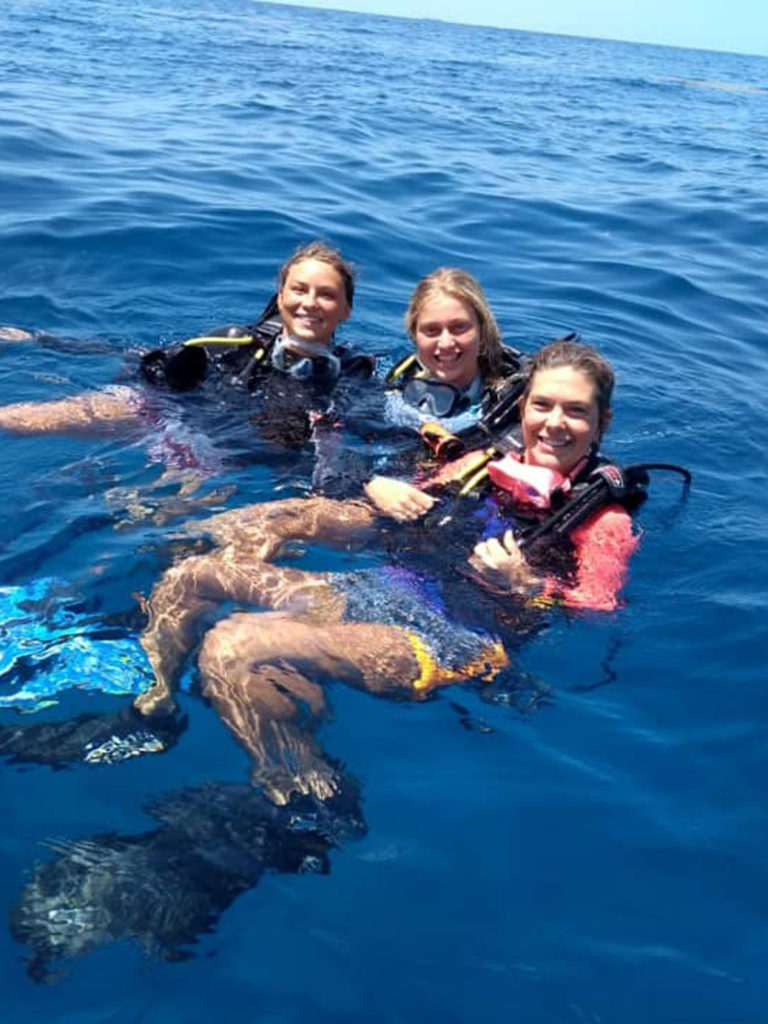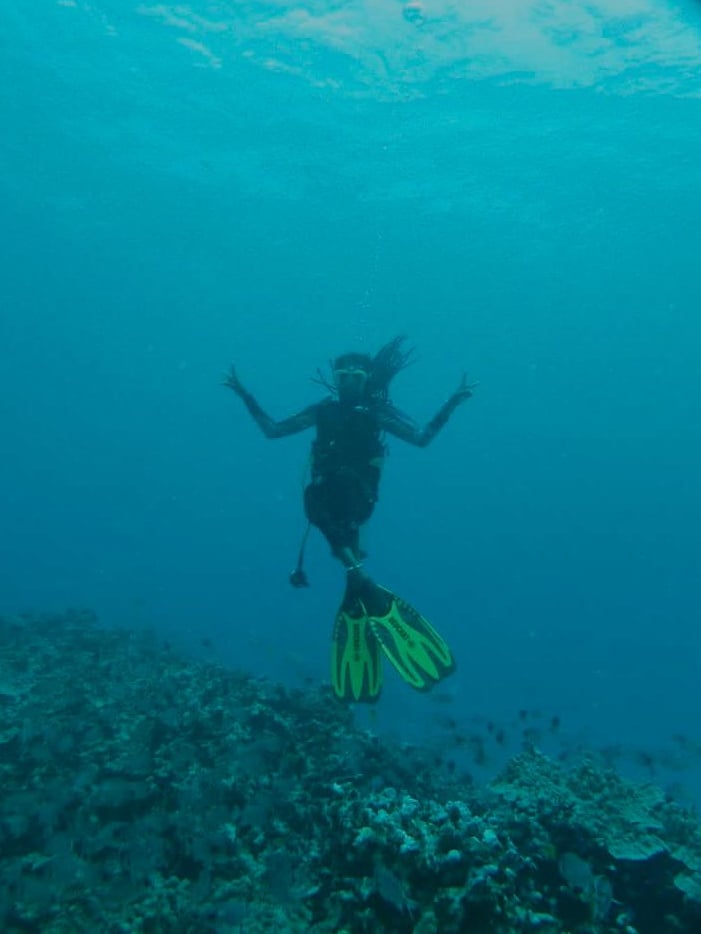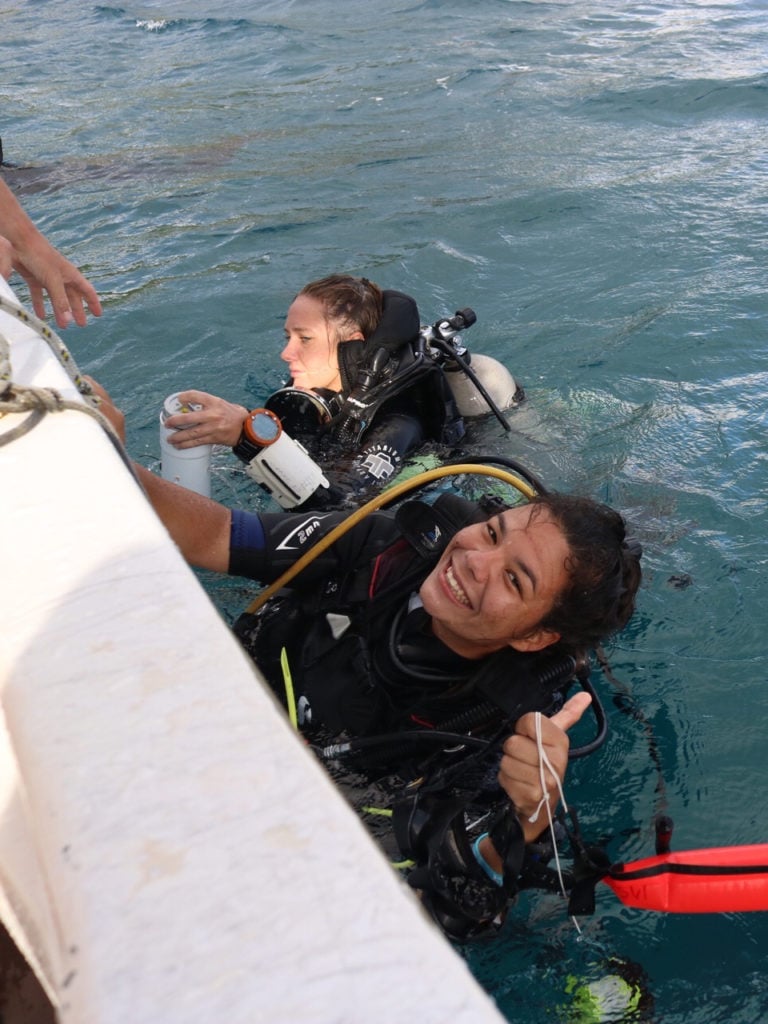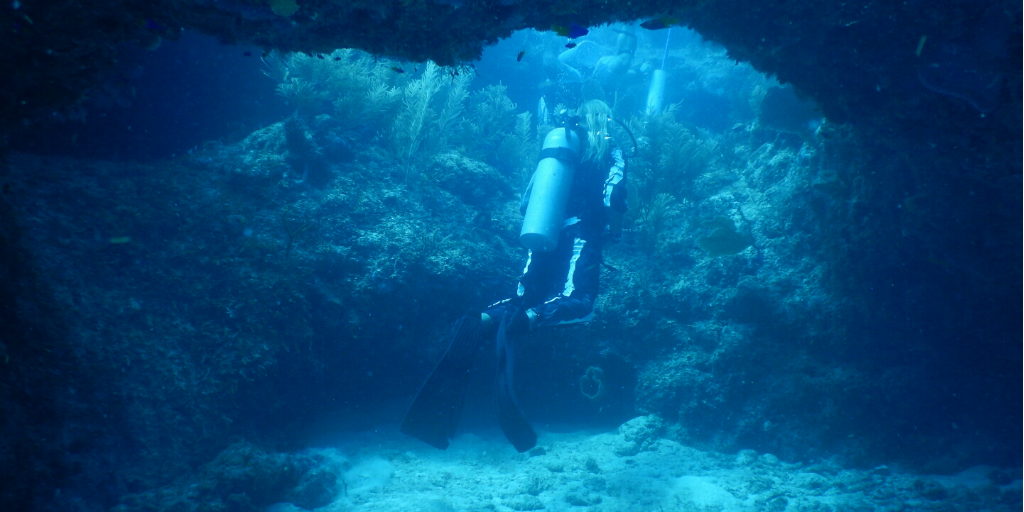Excited to take a gap year after high school and break from studying? Not only does this mean you get to change up your routines but you can also find adventure and purpose.
GVI
Posted: April 20, 2023

Zaytoen Domingo
Posted: October 3, 2022
6 min read
Are you looking to explore the deep blue? Whether you’re just starting out with your Open Water or you’re looking to get more advanced PADI qualifications, GVI has a program for you. Not only will you get the diving qualification and experiences you’re after, but you’ll also get to meet a great group of like-minded people and get stuck into important marine conservation work.
All of GVI’s marine conservation programs include training and guidance from certified dive instructors. This allows volunteers to access world-class teaching for a range of certifications from the Professional Association of Dive Instructors (PADI).
This is the first level of PADI’s certification system. As an Open Water diver, you’ll be able to dive recreationally to a depth of 18 metres. You’ll need to have at least an Open Water Diver qualification before joining most of GVI’s marine conservation programs.
Inexperienced divers can join our projects in Fiji or Mexico for longer durations, so we can give you all the training you need to get your PADI Open Water certificate.
The next step to advancing your diving skills is to complete an Advanced Open Water Diver course. This will help you to build confidence underwater and expand your scuba skills.
You’ll need to complete at least five specialised dives to qualify for your Advanced Open Water Diver, which you can carry out as part of any marine conservation program with GVI.
The Rescue Diver certification teaches you how to prevent and manage problems in the water. At the end of the course, you’ll have the skills necessary to help others in the water.


The more you learn about life under the surface of the ocean, the more you will be driven to protect it.
This is the first level of professional dive training. As a Divemaster, you’ll be able to start making scuba-diving or marine conservation a career. Divemasters can assist diving instructors and carry out a wide range of diving activities. You can enrol in the Divemaster course once you have completed your Rescue Diver certification.
This scuba qualification is the highest level of recreational diving qualification. In order to become a Master Scuba diver you must have completed your Open Water, Advanced Open Water and Rescue Diver qualifications, five PADI Specialty Divers courses, and at least 50 dives. It’s very rare for someone to meet this level of experience, which is why it is known as “the black belt of diving”.
As part of your PADI Divemaster course with GVI, you will have the opportunity to do the Coral Reef Researcher Speciality qualification. This PADI course, which includes specific coral reef research techniques, is exclusive to GVI.
This course will certify you to become a PADI Instructor, allowing you to teach others to become scuba divers themselves. As a higher-level professional qualification, you’ll have access to more career options involving diving once you’ve completed the course.


Dive the blue waters of Mexico, Fiji or Seychelles every day, while helping to protect and research corals, and marine creatures.
Home to the Mesoamerican Barrier Reef System – the second largest barrier reef in the world – Mexico is the perfect place to get your scuba-diving qualifications. And once you’ve gained a scuba-diving qualification or two, you could even explore the underground limestone caves called cenotes in your free time.
While assisting with important conservation work to protect these reefs you can complete your PADI Advanced Open Water, Rescue Diver, Divemaster and Coral Reef Restoration Diver Distinctive Specialty certifications. There are also under 18 volunteering programs where teens can get their PADI Open Water qualification while on a marine conservation adventure.
You can complete your Divemaster course while gaining practical work experience at a local dive centre in the Yucatan Peninsula. This program also includes a marine conservation expedition, with extensive training on marine ecosystems.
Fiji is a Pacific Island nation. The archipelago’s many islands are fringed with dazzling blue water, barrier reefs and calm lagoons. With more than 1,500 species of aquatic creature, you’re almost guaranteed both excellent marine wildlife viewing and ample opportunities for enthusiastic conservation volunteers.
While on a marine conservation adventure in Fiji, you earn both your PADI Divemaster and PADI Coral Reef Research Speciality certificates while participating in daily dives to carry out coral reef surveys in the warm waters of the Pacific Ocean.
Seychelles is famous for its untouched beaches and coral reefs teeming with colourful marine life. This small island nation has a number of endemic animal species, both on land and in the water. It’s a hotspot for research about coral bleaching and climate change, and endangered sea turtle conservation.
On this base you can earn your PADI Advanced Open Water, Rescue Diver and Divemaster qualifications while taking part in marine conservation work – so having your PADI Open qualification is a must.
Along with dive training, you’ll learn how to identify and monitor coral species and earn your Coral Reef Researcher Speciality qualification. You’ll be working alongside an international team of researchers to help aid coral reef recovery.
Browse more of our combined marine conservation and dive training programs today and choose from volunteer projects or internships in some of the most pristine locations in the world.
By Zaytoen Domingo
Excited to take a gap year after high school and break from studying? Not only does this mean you get to change up your routines but you can also find adventure and purpose.
GVI
Posted: April 20, 2023